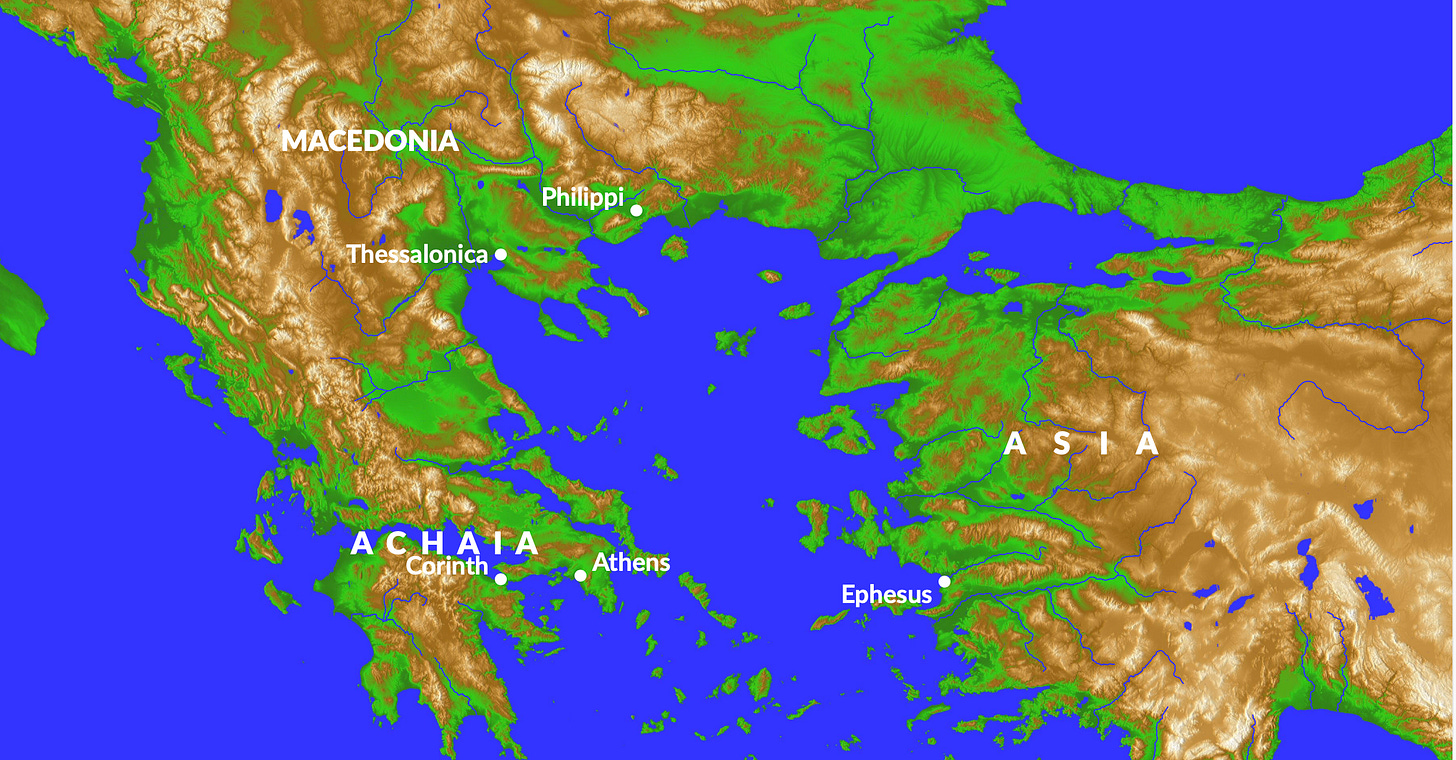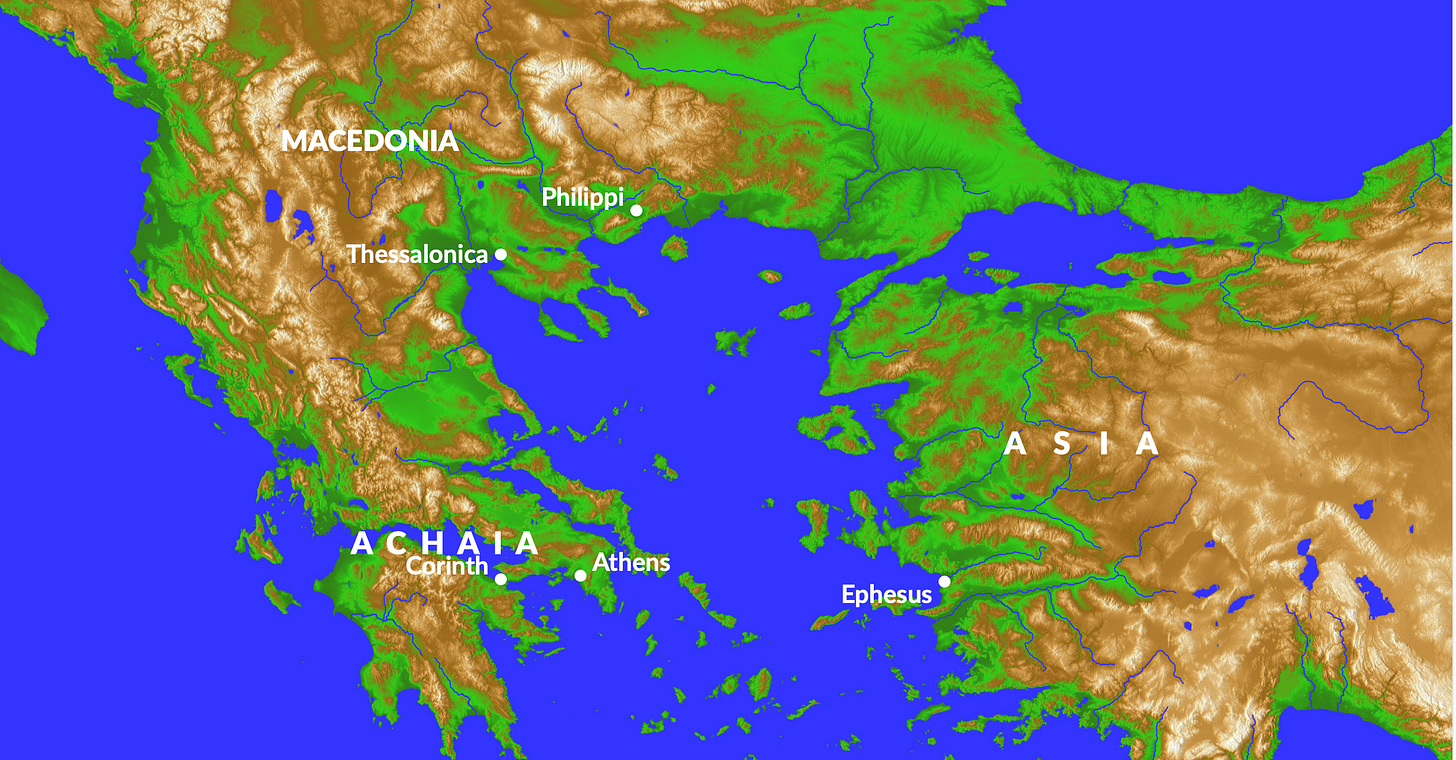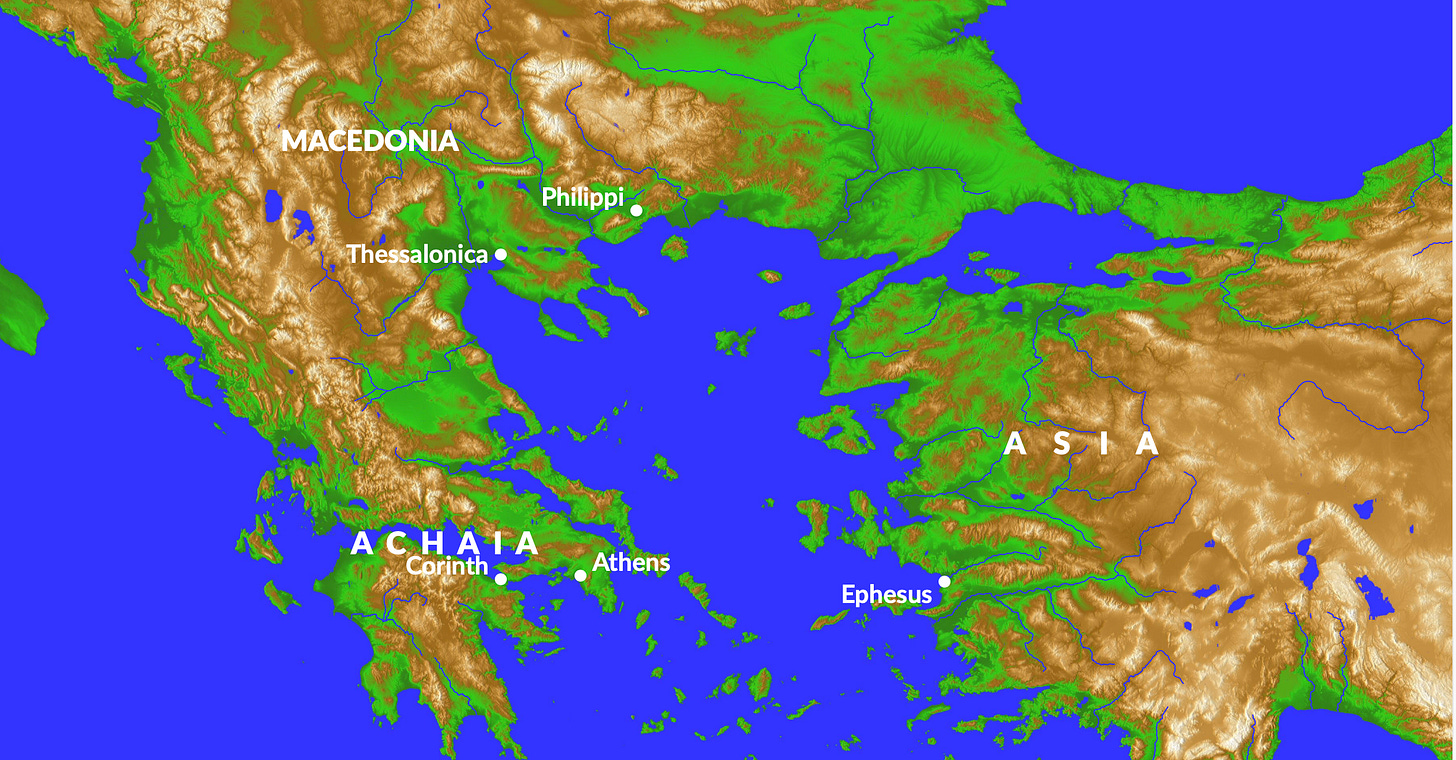Daily Scripture Reading 2Corinthians 1:1-18
Humans do not like affliction because it is painful. Thus, we tend to complain and feel sorry for ourselves when we endure opposition and persecution. Sometimes we feel entitled to a pain-free life.
We know from the book of Acts that Paul endured a lot of affliction, far more than has been experienced by most Christians throughout church history. Paul did not feel sorry for himself. In fact, in today’s reading we will see that he wrote about the positive side of being afflicted.
Today, we start reading through 2 Corinthians.
2Cor. 1:1 ¶ Paul, an apostle of Christ Jesus by the will of God, and Timothy our brother, ¶ To the church of God which is at Corinth with all the saints who are throughout Achaia:
Paul visited Corinth during his second missionary journey, a visit recorded in Acts 18. During his third journey, he spent several years in Ephesus, see Acts 19, from where he wrote 1Corinthians, see 1Cor 16:8. In that letter, he promised to visit Corinth again.
Corinth was a city in the province of Achaia. Achaia was in the southern part of the area known today as the country of Greece.
2Cor. 1:2 ¶ Grace to you and peace from God our Father and the Lord Jesus Christ.
2Cor. 1:3 ¶ Blessed be the God and Father of our Lord Jesus Christ, the Father of mercies and God of all comfort,
2Cor. 1:4 who comforts us in all our affliction so that we will be able to comfort those who are in any affliction with the comfort with which we ourselves are comforted by God.
Note that God comforted Paul during his affliction, so that Paul could comfort others during their affliction.
It is natural for humans to complain about affliction, after all, affliction is painful. However, affliction can be good for us. One of the benefits is that affliction leads to God’s comfort, which enables us to comfort others when they are afflicted. As Christians, we should be thankful for affliction which makes us better people.
2Cor. 1:5 For just as the sufferings of Christ abound to us, so also our comfort abounds through Christ.
2Cor. 1:6 But whether we are afflicted, it is for your comfort and salvation; or whether we are comforted, it is for your comfort, which is working in your perseverance in the same sufferings which we also suffer.
2Cor. 1:7 And our hope for you is firmly grounded, knowing that as you are sharers of our sufferings, so also you are sharers of our comfort.
2Cor. 1:8 ¶ For we do not want you to be unaware, brothers, of our affliction which came to us in Asia, that we were burdened excessively, beyond our strength, so that we despaired even to live.
Asia was a province in the western end of the area known today as the country of Turkey. Ephesus was in Asia. Paul passed through Asia during his second missionary journey, but there is not much detail about those travels. During his third missionary journey he spent several years in Ephesus. Acts 19 records some of the opposition Paul faced in Asia.
2Cor. 1:9 Indeed, we had the sentence of death within ourselves so that we would not have confidence in ourselves, but in God who raises the dead;
2Cor. 1:10 who rescued us from so great a peril of death, and will rescue us, He on whom we have set our hope. And He will yet rescue us,
2Cor. 1:11 you also joining in helping us through your prayers on our behalf, so that thanks may be given on our behalf by many persons for the gracious gift bestowed on us through the prayers of many.
Take note of the phrase “helping us through your prayers”. The Corinthians were in Corinth, which was on the other side of the sea from where Paul was enduring his affliction. And yet the Corinthians were able to help Paul by praying.
Oftentimes, modern Christians have the mindset that missionaries are sent off to foreign lands to do ministry, while those who don’t go are not doing foreign ministry. This verse teaches us that those who don’t go can participate in the ministry by praying. Praying people are helpers to those who are sent.
2Cor. 1:12 ¶ For our boasting is this: the testimony of our conscience, that in holiness and godly sincerity, not in fleshly wisdom but in the grace of God, we have conducted ourselves in the world, and especially toward you.
Look at the phrase “not in fleshly wisdom”. Paul did not conduct himself according to fleshly wisdom. Instead, he lived according to God’s standards of holiness and sincerity.
Humans tend to want to be in the majority, so when our culture establishes certain standards of behavior, we tend to want to live according to their standards. However, sometimes the standards of the world are contrary to the standards of God. Paul wrote that he lived according to God’s standards, not the world’s standards.
2Cor. 1:13 For we write nothing else to you than what you read and understand, and I hope you will understand until the end,
2Cor. 1:14 just as you also partially did understand us, that we are your reason for boasting as you also are ours, in the day of our Lord Jesus.
2Cor. 1:15 ¶ And in this confidence I intended at first to come to you, so that you might receive grace twice;
2Cor. 1:16 that is, to pass your way into Macedonia, and again from Macedonia to come to you, and by you to be helped on my journey to Judea.
During his third missionary journey, Paul spent several years in Ephesus. His intent was to go to Macedonia after Ephesus. His first thought was to go through Corinth on his way to Macedonia, and then go through Corinth again when he left Macedonia to go to Judea.
From Ephesus, Paul could have sailed directly to Macedonia, or he could have sailed to Achaia and then traveled to Macedonia by land.
2Cor. 1:17 Therefore, was I vacillating when I intended to do this? Or what I purpose, do I purpose according to the flesh, so that with me there will be yes, yes and no, no at the same time?
2Cor. 1:18 But as God is faithful, our word to you is not yes and no.
Apparently, Paul did not go through with his plan to visit Corinth twice, which made it look like Paul was vacillating and saying opposite things at the same time. Paul assured the Corinthians he had not been duplicitous. Tomorrow we will read Paul’s explanation of why he did not visit Corinth both on his way to and from Macedonia.
During his ministry, Paul suffered a tremendous amount of affliction and persecution. He did not feel sorry for himself. Instead, he rejoiced that God comforted him during his affliction, which gave him the ability to comfort others during their suffering.
What is some of the affliction you have endured as a Christian?
How has your persecution made you stronger?
How has God comforted you during your suffering?
How are you able to comfort others as a result of the trials you have experienced?
Thanks for visiting Bible Mountain. If you have already joined my email list, thank you and please tell others about Bible Mountain. If you have not joined my email list yet, please do so now. In order to join, go to Bible Mountain dotcom, click on subscribe, and that will take you to a page where you can sign up. Your email address will not be sold nor given away. Once again, thanks for visiting Bible Mountain.
“Scripture quotations taken from the (LSB®) Legacy Standard Bible®, Copyright © 2021 by The Lockman Foundation. Used by permission. All rights reserved. Managed in partnership with Three Sixteen Publishing Inc. LSBible.org and 316publishing.com.”



